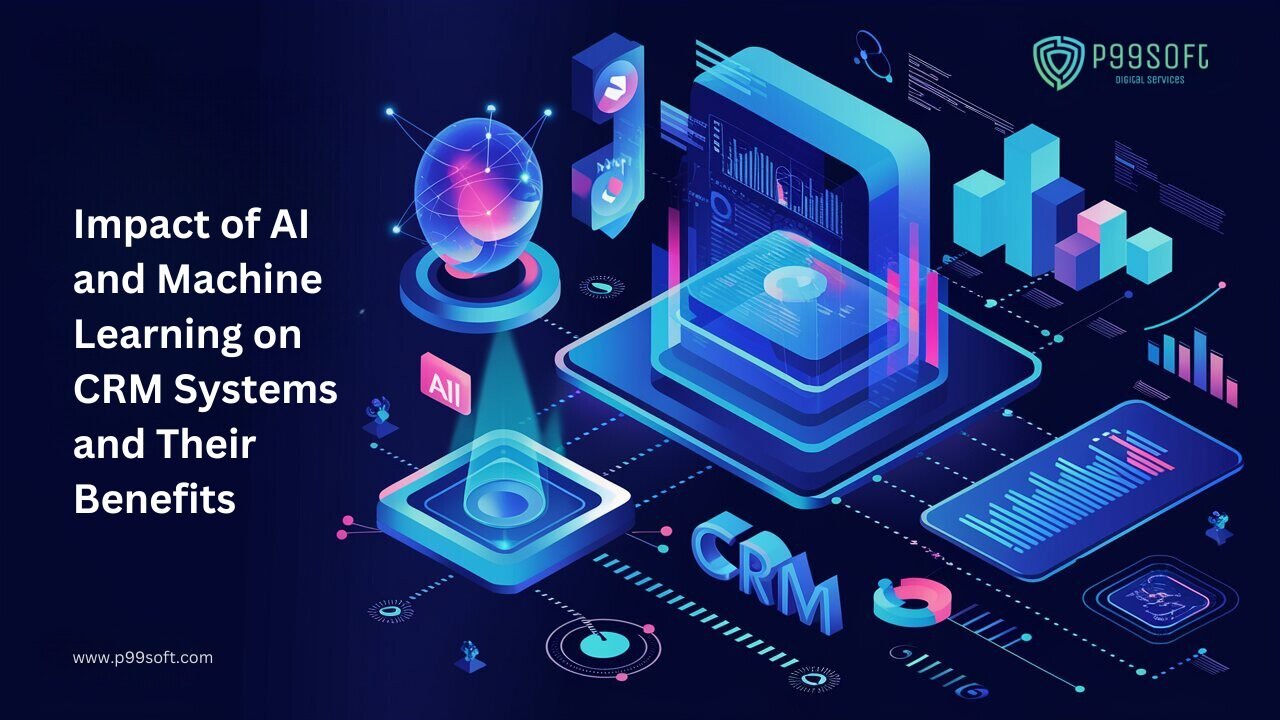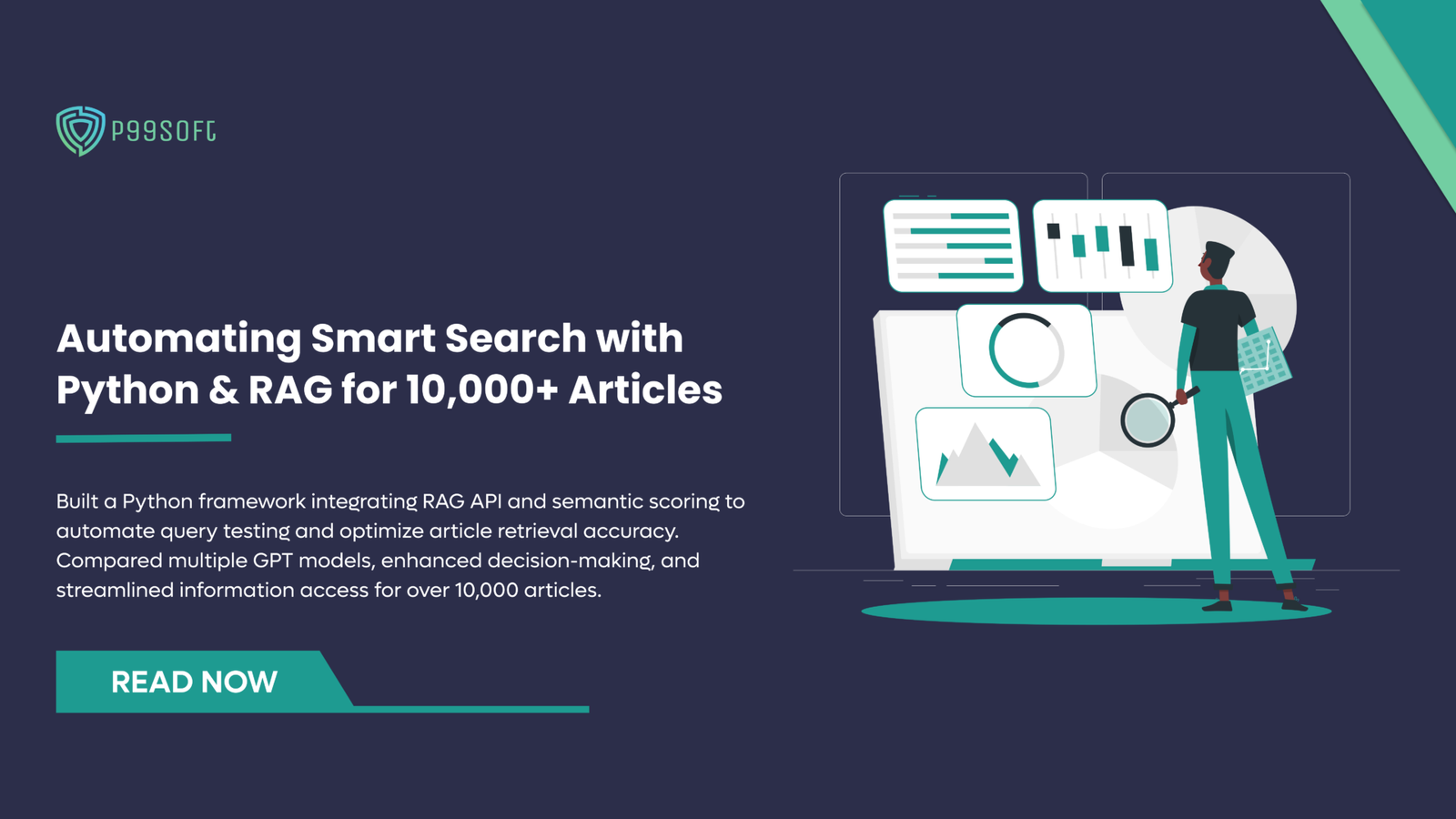Customer Relationship Management (CRM) systems have always been crucial for businesses, helping them keep track of and manage interactions with customers, both current and potential. With the integration of Artificial Intelligence (AI) and Machine Learning (ML), these systems are experiencing a major upgrade, revolutionizing how companies understand and engage with their customers. This article gives us a fair idea about how AI and ML are transforming CRM systems, the benefits they bring, and how companies like P99soft are seamlessly incorporating these advancements.
The Evolution of CRM Systems
In the beginning, CRM systems were mostly about storing data and handling basic customer interactions. Over time, as businesses needed deeper insights into customer behavior, these systems evolved to include more advanced analytics and automation features. The latest leap forward is the incorporation of AI and ML, turning CRM systems into powerful tools for predictive analytics, personalized marketing, and superior customer service.
How AI and ML Integrate with CRM Systems
Predictive Analytics
Imagine being able to predict what your customers will need before they even know it themselves. Predictive analytics uses AI and ML to analyze past data and forecast future trends, behaviors, and outcomes. This ability helps businesses make smarter decisions, keep customers happier, and boost sales.
Example: Enhancing Customer Support
Let’s say you run an online electronics store. Your customer support team handles various inquiries, from product questions to troubleshooting issues. With predictive analytics, AI can analyze past support interactions and predict which customers might face problems in the future. Here’s a simplified process:
- Data Collection: The AI system gathers data from different sources, like old customer support tickets, customer purchase history, and social media interactions. This data might include information about what products were bought, how often support was needed, and what kinds of issues were reported.
- Data Analysis: The AI system looks at this past data to find patterns. For example, it might be noticed that customers who bought a specific smartphone model often had battery problems within the first three months.
- Predictive Modelling: Using machine learning, the AI system creates a model that can predict which customers might need support based on their purchase history and other factors. It might predict that customers who buy a certain laptop model and live in humid climates are more likely to report overheating issues.
- Actionable Insights: The AI system gives these insights to your customer support team. Now, your team knows which customers are likely to face issues and can reach out to them before problems arise. For example, they can email customers who bought the laptop model with tips on how to prevent overheating.
- Ticket Prioritisation: Predictive analytics can look at new support tickets to guess which ones might become bigger problems or take longer to solve. This helps the support team focus on urgent issues first and uses their resources more wisely.
- Customer Satisfaction: By looking at past interactions, Predictive analytics can predict how happy a customer is likely to be. If a customer might be unhappy based on their history, the support team can give extra attention to make sure the issue is resolved well.
Benefits of AI and ML in CRM Systems
Improved Customer Insights
AI and ML significantly improve customer insights by analyzing vast amounts of data and uncovering patterns and trends that may be invisible to the human eye. Techniques such as natural language processing (NLP) and sentiment analysis enable AI to interpret customer feedback from a variety of sources, including social media, email and surveys. This in-depth analysis allows companies to understand their customers at a more detailed level, predicting needs and behaviors, which helps in adapting personalized marketing strategies and improving overall customer satisfaction. P99Soft is already helping some of their clients to understand their customers in depth.
- Sentiment Analysis: Using sentiment analysis, companies can gauge customer emotions and opinions from their feedback, leading to more informed decisions about improving customer service and marketing strategies.
- Customer Segmentation: AI and ML can analyze customer data and create detailed segments, enabling more targeted and effective marketing campaigns that resonate with specific groups of customers.
- Predicting customer churn: Machine learning models can predict which customers are likely to churn, enabling proactive measures to retain them through personalized offers and interventions.
Increased Efficiency
Incorporating AI and ML into CRM systems leads to increased operational efficiency through the automation of routine tasks and processes. AI systems can handle data entry, manage schedules and prioritize leads based on likelihood of conversion. This automation reduces the workload for human employees and minimizes the risk of errors. Machine learning algorithms continuously optimize processes by learning from past data, ensuring that the CRM system becomes more efficient over time. This allows employees to focus on more strategic activities that drive business growth.
- Automated data entry: AI systems can automatically enter and update customer information, reducing manual entry errors and saving time.
- Smart Scheduling: AI can optimize meeting schedules by taking into account factors such as availability and customer preferences for better time management.
- Lead scoring: Machine learning algorithms can score leads based on likelihood of conversion, allowing sales teams to effectively prioritize their efforts.
- Process automation: Artificial intelligence can streamline various business processes, reducing the time and effort required for tasks such as order processing, customer registration, and troubleshooting.
Improved Decision-Making
AI and ML facilitate better decision making by providing actionable insights derived from complex data sets. Predictive analytics enables businesses to predict trends, customer behavior and potential risks, enabling more informed strategic decisions. Artificial intelligence algorithms can process data in real time and offer recommendations on best practices, whether it’s optimizing marketing campaigns, improving product offerings, or adjusting sales strategies. P99soft is helping their clients by integrating AI and ML into CRM systems, clients can use data-driven insights to make decisions that are timely and highly accurate, contributing to business success.
- Predictive analytics: AI models can analyze historical data and predict future customer behavior, helping businesses anticipate market trends and adjust strategies accordingly.
- Real-time insights: AI can process data in real-time and provide up-to-the-minute insights that allow businesses to quickly respond to changing customer needs and market conditions.
- Optimization recommendations: AI-driven insights can suggest ways to optimize marketing campaigns, sales processes, and customer service strategies to improve overall business performance.
Automation
Automation is one of the outstanding benefits of AI and ML in CRM systems. Through AI-driven automation, tasks like sending follow-up emails, scheduling meetings and generating reports are handled seamlessly. AI-powered chatbots can interact with customers in real time, provide instant support and resolve common queries without human intervention. This speeds up response times and ensures consistency in customer interactions. By automating repetitive tasks, businesses can provide faster and more reliable service, leading to higher customer satisfaction and retention.
- AI Chatbots: These virtual assistants can handle a wide range of customer queries, providing instant answers and freeing up human agents for more complex problems. Read more about AI Chatbots.
- Automated follow-up: AI can automatically send personalized follow-up emails based on customer interactions, ensuring timely communication and increasing customer engagement.
- Report generation: AI systems can generate detailed reports and analytics that provide valuable insights without the need for manual data compilation.
Global Patterns and Trends
Global patterns and trends of AI and ML in CRM systems highlight the transformative impact these technologies are having across industries. With the rapid adoption of AI and ML, they are reshaping the CRM landscape. As businesses continue to adopt these technologies, we can expect even more innovative applications and improvements in customer relationship management.
- Rapid adoption across industries: AI and ML technologies have been adopted by a wide range of industries, including retail, finance, healthcare and telecommunications. This adoption is driven by the need to improve customer experience, streamline operations and gain competitive advantage. For example, retail companies use AI-based CRM systems to personalize customer interactions, while financial institutions use ML algorithms to detect fraudulent activity and predict customer behavior. Read more on AI adoption across industries.
- Increasing investment in AI and ML technologies: The global market for AI and ML in CRM systems is witnessing significant investment. Companies allocate significant portions of their budgets to develop and integrate these technologies into their CRM platforms. The global market for AI in CRM is projected to expand significantly, with its value anticipated to surge from USD 4.1 Billion in 2023 to around USD 48.4 Billion by 2033. This represents a robust compound annual growth rate (CAGR) of 28% over the forecast period from 2024 to 2033. This increase in investment is fueled by the potential return on investment that AI and ML technologies promise, including better customer retention and higher sales conversions. Learn more from Grand View Research.
- Focus on data privacy and security: As CRM systems become more intelligent and data-driven, there is an increased focus on data privacy and security. Regulations such as the General Data Protection Regulation (GDPR) in Europe and the California Consumer Privacy Act (CCPA) in the United States force companies to ensure that their AI and ML applications meet strict data protection standards. Companies are now investing in advanced security measures such as encryption and anonymization to protect customer data and maintain trust. Discover more about data privacy regulations.
- NLP: Improving communication with CRM users: CRM systems rely heavily on natural language processing (NLP) to streamline interactions with customers, improve data entry and retrieval processes, and increase the overall effectiveness of communication between CRM users and customers. By analyzing the language patterns and emotions expressed in customer communications, NLP helps businesses better understand customer sentiment, allowing them to tailor their responses accordingly. In terms of personalization capabilities, NLP also plays a key role in supporting multiple languages in CRM systems. It allows these systems to understand different dialects while tailoring individual experiences based on preferences for each interaction. This ensures that customers receive more efficient service by enabling personalized solutions tailored to their needs using the multi-language support provided by NLP technology. Check out NLP technology in CRM.
- The impact of artificial intelligence on employment and the workforce: AI tools have helped increase work productivity to a greater extent. AI may replace a few, but it probably won’t make the human workforce obsolete. Read more on AI and the future of work.
Challenges and Future Directions
- Data Quality and Integration: The effectiveness of AI and ML in CRM systems depends on the quality of data. Ensuring accurate and comprehensive data integration from various sources remains a challenge for many businesses.
- Skill Gap: There is a growing demand for professionals skilled in AI, ML, and data analytics to manage and optimize AI-powered CRM systems. Addressing this skill gap is crucial for maximizing the benefits of these technologies.
- Ethical Considerations: The use of AI and ML in CRM systems raises ethical considerations, including data privacy, algorithmic bias, and transparency. Businesses must navigate these challenges to ensure ethical AI usage.
Future Directions
The future of AI and ML in CRM systems looks promising, with continuous advancements expected in predictive analytics, personalization, and automation. Emerging technologies such as edge computing and quantum computing could further enhance AI capabilities in CRM, providing even more powerful tools for businesses to engage with their customers.
Conclusion
AI and ML integration into CRM systems is transforming how businesses manage customer relationships. These technologies offer significant benefits, including improved customer insights, increased efficiency, better decision-making, and enhanced automation.
As businesses continue to invest in AI and ML, the future of CRM systems looks bright, promising even more innovative and effective ways to engage with customers. The integration of AI and ML into CRM systems is transforming how businesses understand and interact with their customers.
By providing predictive insights, personalized marketing, and enhanced customer service, AI-powered CRM systems like those offered by P99Soft provide significant benefits, including improved customer insights, increased efficiency, and enhanced decision-making to their customers. P99Soft has adopted these technologies and are driven by the need for better customer engagement and competitive advantage.




